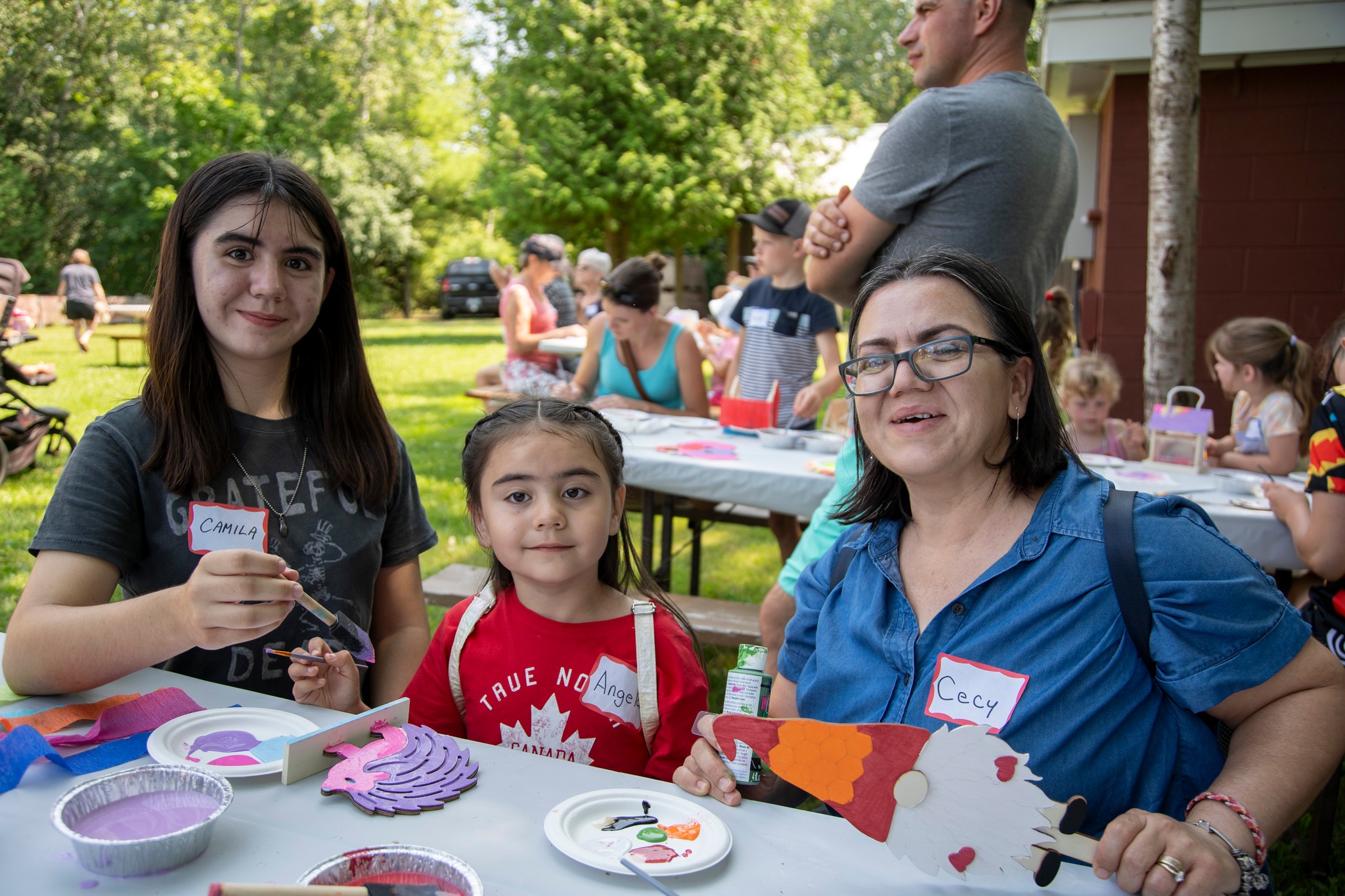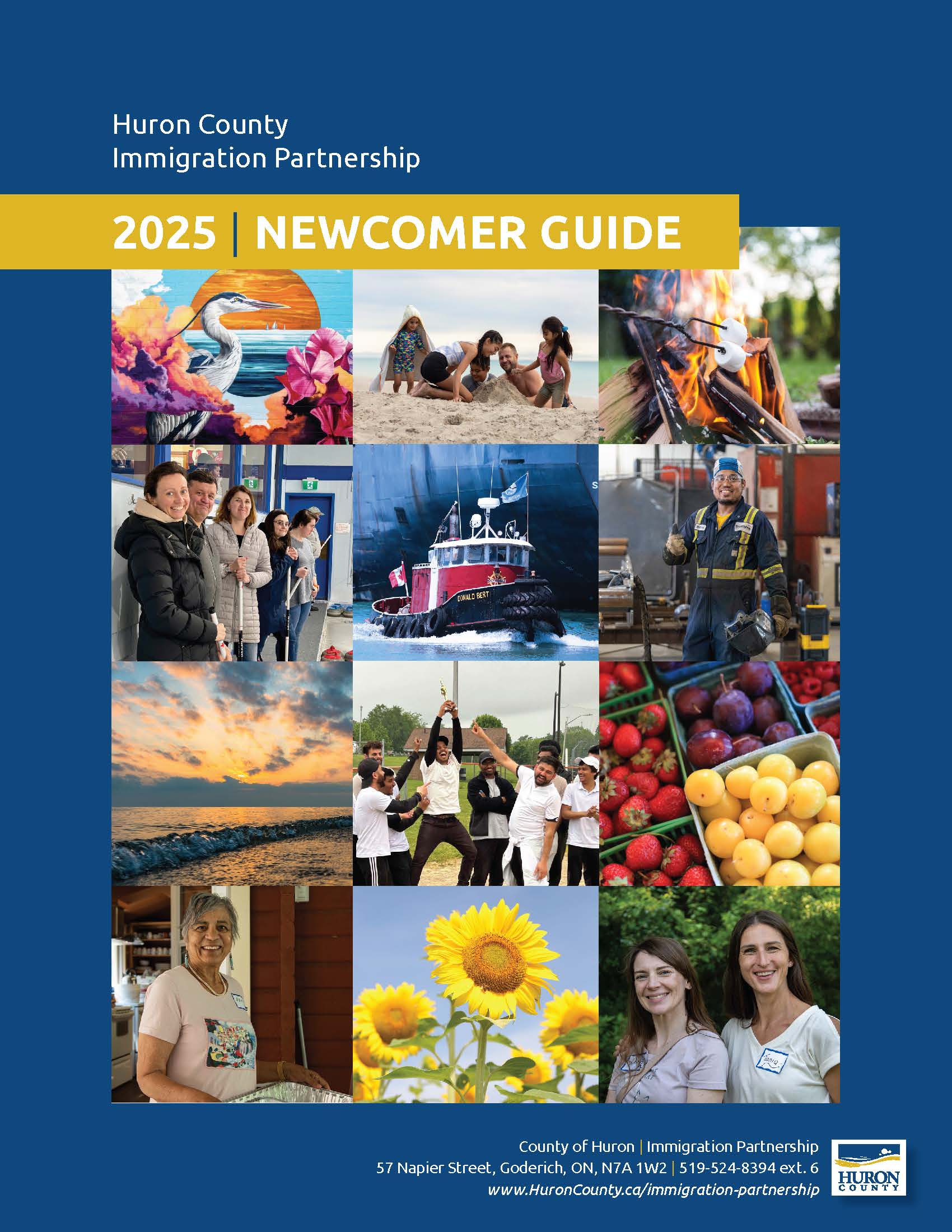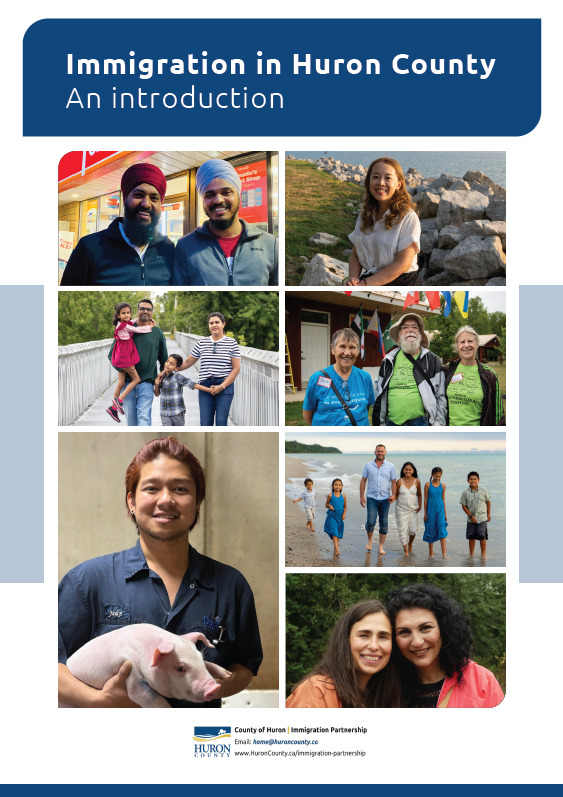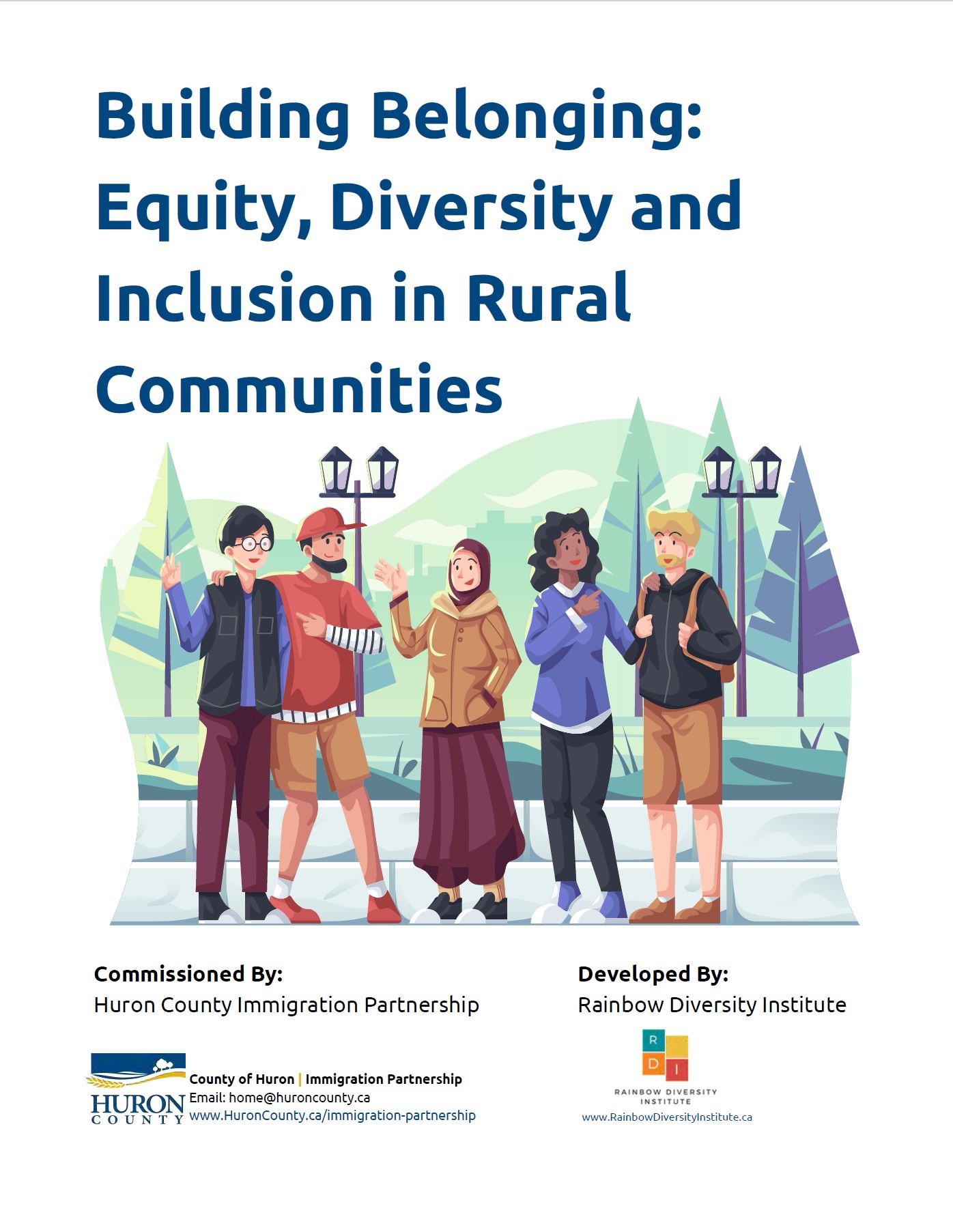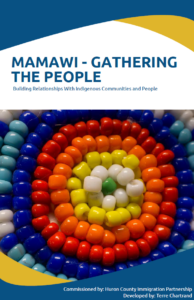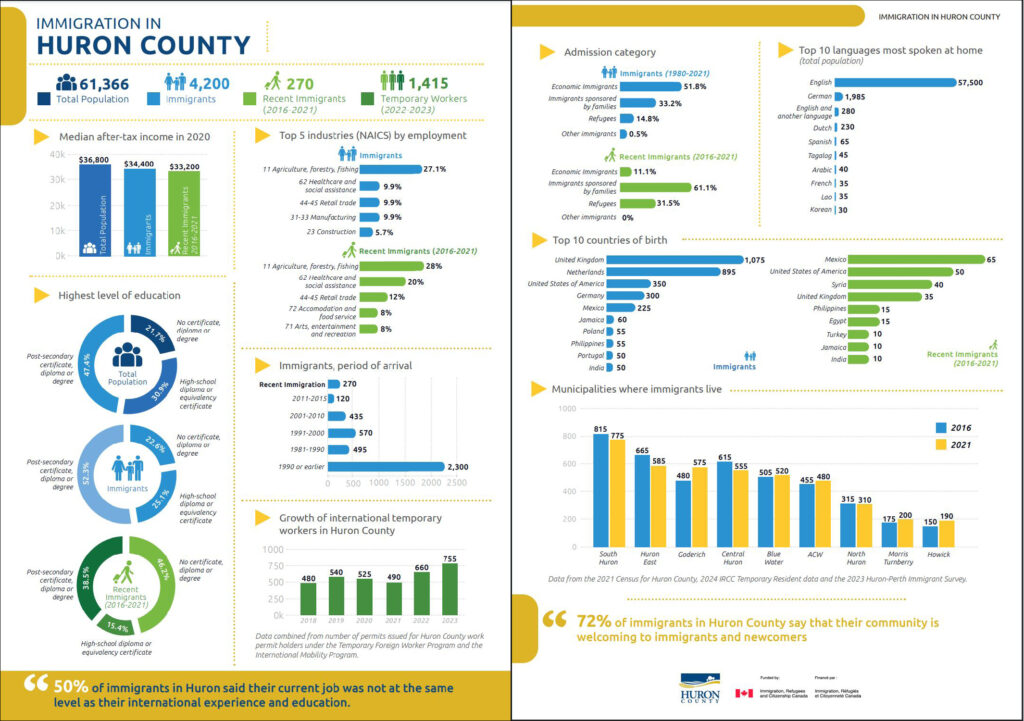Immigration Partnership
New to Canada?
Welcome to Huron County! We have some of Canada’s best beaches, the prettiest sunsets and stunning hiking trails. Our farmers’ markets and tasting trails are a great way to discover one of Ontario’s most agriculturally productive regions.
Huron County is divided into nine municipalities and is home to five towns: Clinton, Exeter, Goderich, Seaforth and Wingham. There are five villages: Bayfield, Blyth, Brussels, Hensall and Zurich, along with more than 60 hamlets.
If you are a newcomer to Canada, you can get FREE settlement services. Please call the Newcomer Settlement Advisor for Huron County to make an appointment at (226) 973-7572.
Immigration, Refugees and Citizenship Canada funds the YMCA of Southwestern Ontario to provide newcomer settlement services. Settlement advisors support newcomers to Canada as they settle.
Our Working Groups
Immigrant Advisory Council
This working group focuses on guiding and supporting the development and implementation of activities that celebrate diversity and foster belonging. The group also focuses on making Huron County a place where immigrants feel like they belong and are welcomed.
Research Working Group
This working group has been formed to improve the Local Immigration Partnership’s knowledge of the trends related to the settlement and integration in Huron County. The research working group’s goal is to collect data on how to enhance services and inform the Immigration Partnership and community strategies to retain newcomers in the region.
Employment Working Group
This working group focuses on improving the employment and skills development outcomes of newcomers in the region. The goal of this group is to inform employers of the benefits of hiring newcomers and to identify strategies to retain a newcomer workforce, as well as identifying initiatives that support newcomer businesses. The working group advises the Local Immigration Partnership on employment and labour-related matters and trends.
Campaigns and Events
I Am Huron
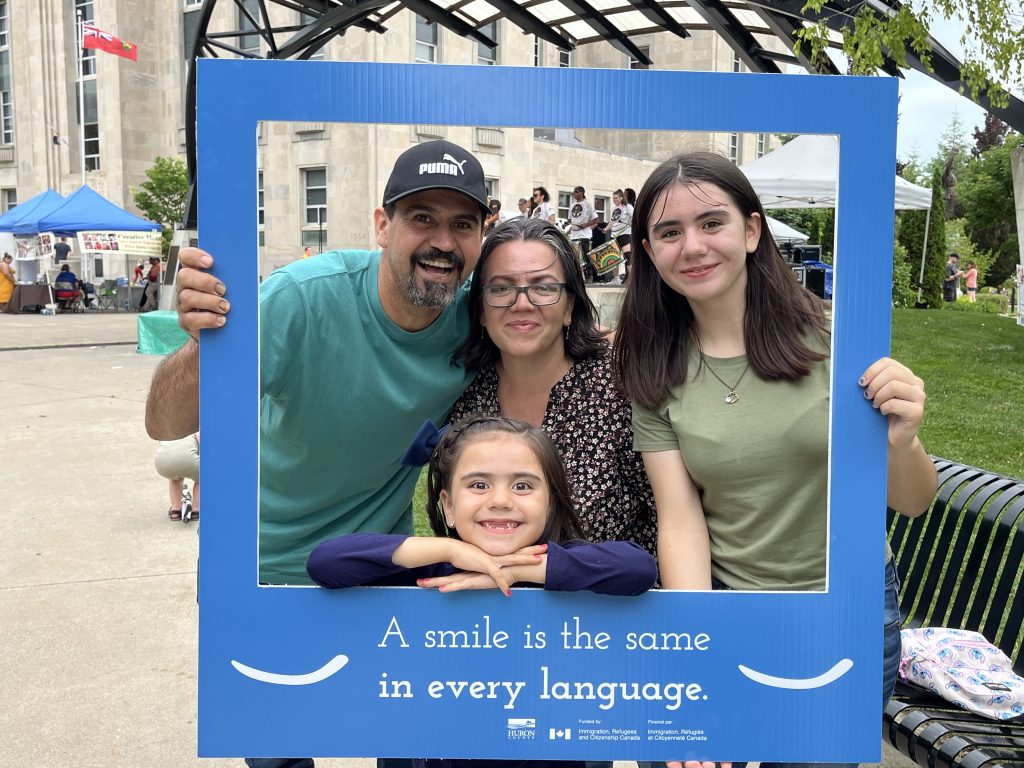
Welcoming Week
September 12-25, 2025 | In communities throughout Huron County
Huron County Immigration Partnership, in collaboration with Immigration, Refugees and Citizenship Canada (IRCC) and other Immigration Partnerships across Canada, celebrate Welcoming Week. For Huron County, Welcoming Week is about inspiring people to think about what we can do to ensure everyone–including newcomers and immigrants–thrives and feels welcomed. During Welcoming Week, we affirm the importance of the values that unite us as neighbours, friends, and colleagues, regardless of where we come from.
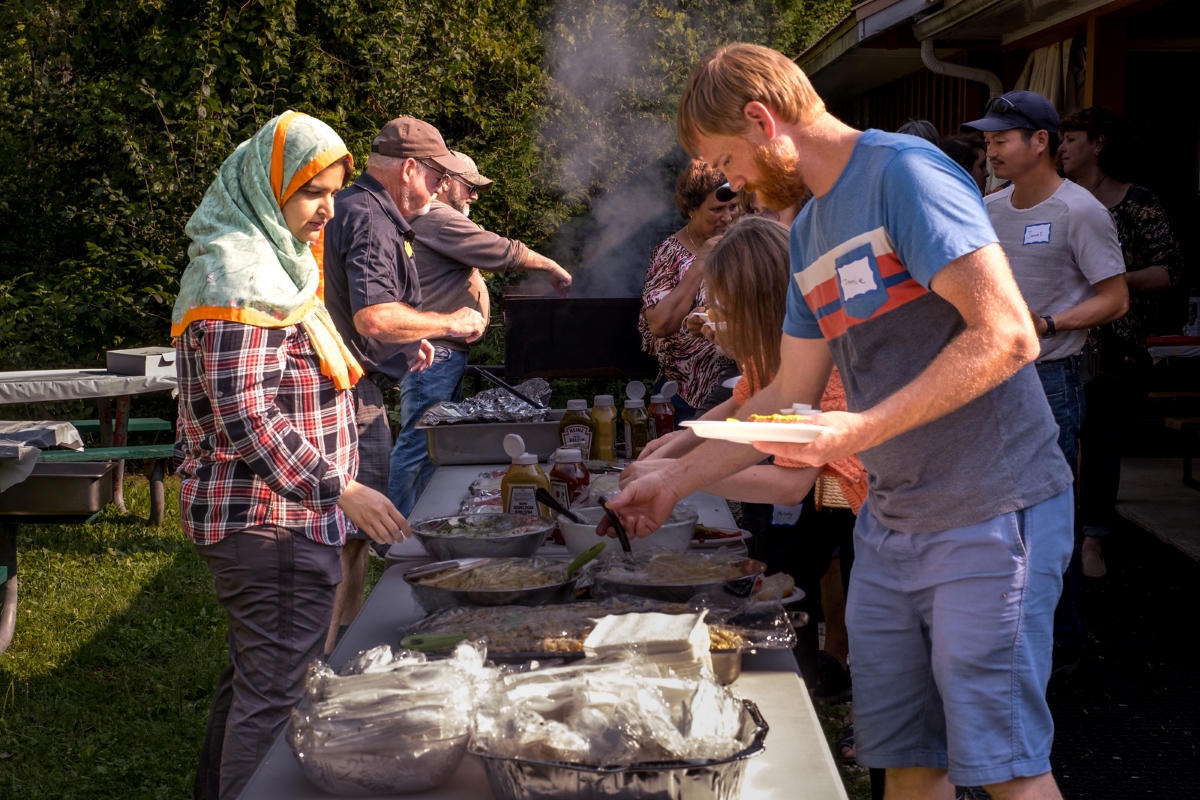
Newcomer Day at Camp
August 23, 2025 | Camp Klahanie | 2:00 pm to 7:00 pm
This event is hosted by The Goderich Lions, the YMCA of Southwestern Ontario and the Huron County Local Immigration Partnership. Admission is FREE.
Research & Resources
MAMAWI - GATHERING THE PEOPLE: Building Relationships with Indigenous Communities (2025)
Canada’s communities are shaped by many histories and cultures, including those of Indigenous Peoples who have lived on this land for thousands of years. Understanding this context helps newcomers better understand where they are living and how relationships are formed within communities. MAMAWI – GATHERING THE PEOPLE supports learning, curiosity, and respectful connection.
Measuring the impact of a 10-Week English language course (2025)
Over the winter of 2025, the Huron County Local Immigration Partnership worked alongside Set7 Skills and Technology, North Perth & Region to lead a pilot project offering weekly English language classes to adults in the hamlet of Dashwood, Ontario.
The project enabled more than 20 newcomers to Canada, who were on temporary work permits, to improve their English language skills over a 10-week period. The English language classes were funded thanks to support from the Huron County Economic Development Board and the Municipality of South Huron.
This report provides an evaluation of those classes and highlights their impact:
Newcomer Experiences of Housing in Huron-Perth (2025)
Read the Newcomer Housing Experiences of Housing in Huron-Perth 2025 Report
By conducting focus group discussions with 40 newcomers to Canada, who had been in the country for less than six years, the Huron County Immigration Partnership identified 10 key findings about newcomer experiences of housing in Huron and Perth Counties.
Those findings included:
- Housing must be looked at alongside employment and transportation, as the three components are intertwined.
- Newcomers often paid a greater portion of their overall monthly income to housing, in comparison to other groups. Among those most significantly affected by housing affordability were newcomers who had escaped war and resettled in Huron or Perth Counties. Among this group, participants paid up to 80% of their monthly income on housing. Additionally, larger families struggled to find rental options with enough bedrooms.
- A lack of credit history and employment history impacted newcomers’ ability to find their first place to rent. Often, newcomers had to face many rejections after submitting rental applications or experienced lengthy wait times to hear back from a landlord.
- Newcomers often relied on friends, family, employers and acquaintances for temporary housing when they first arrived, and many moved more than once within the first five years as they search for affordable options.
- To save money, newcomers often shared housing. During the research process, we heard of multiple children sharing bedrooms and up to 10 adults living together in a dwelling with only one bathroom.
- Many newcomers reported having good relationships with their landlords. A good landlord was defined by the participants as one that is responsive to their requests and needs. A few participants shared concerns about unfair treatment of newcomer tenants from landlords, particularly in shared accommodation.
- When looking for a place to live, newcomers most frequently relied on established relationships, seeking support from a family member or friend to find housing. Facebook was also frequently turned to look for housing in the area. Participants did not access government sources when searching for housing information and were unfamiliar with social housing support. Participants indicated they were unfamiliar with tenant rights.
- Newcomers told the research team they enjoyed living in small or rural areas for the sense of safety, connection to nature, and slower pace of life compared to urban centres.
- Participants highlighted that they particularly valued the support from community members, such as receiving rides or celebrating holidays together, fostering a strong sense of belonging.
- Although many newcomers wished to stay in the community they currently lived in, their ability to do so was often hindered by high housing costs, limited employment opportunities, and immigration policies, particularly for those on temporary permits.
These findings highlighted the complex, multifaceted challenges newcomers faced in securing stable housing in rural Canada. Given the gap in information about housing experiences of newcomers in small and rural communities, it’s hoped this research will inform conversations locally, provincially and nationally.
Huron-Perth Immigrant Survey (2023-2024)
Key findings about the survey respondents:
- 195 immigrants and newcomers to Canada participated in the survey and represented some of the major categories of immigrants – family, economic and temporary work visas
- 65% of participants indicated that they were newcomers, living in Canada for less than five years
- 62% of participants indicated they are a racialized person (i.e. they hold at least one non-white racial identity)
- 92% of participants reported speaking English well and 89.4% reported being proficient in reading and writing in English
Community Integration
- 69% said their community was welcoming
- 60% reported they would be recommend their community to other immigrants to move to
- 69% of participants in Huron and 65% in Perth reported they felt a sense of belonging in their communities
- 37% reported volunteering, with most volunteering with organizations focused on immigrants and newcomers, religious services, or sports and recreation
Education, Employment and Income
- 43% reported that their level of international education did not corresponded with the level of their Canadian job
- 76% were employed (full-time and part-time, including self-employed or owning their own business)
- 40% reported that their income was not enough for their household needs
Key Challenges and Solutions
- The cost of living and financial issues was the biggest challenges identified, with 53% in Huron and 41% in Perth expressing this concern in the past year
- The most helpful change suggested by participants to better support other immigrants in Huron and Perth Counties was:
- Implement better programs for immigrants to find work or start a business (34%)
- Improve the availability of public transportation (28%)
- Have more affordable housing available (26%)
- Improve social integration (23%)
- Increase education for employers on hiring, retaining and promoting immigrants (23%).
Snapshot of Discrimination in Huron County (2023)
Community Engaged Scholarship Institute at the University of Guelph and Huron County Immigration Partnership, 2023
By Emily Duncan and Meghan Wrathall
This qualitative research project conducted semi-structured interviews with people who were visible minorities and lived in Huron County.
The project identified that discrimination included overt comments and insults, microaggressions, and differential treatment in public spaces due to race. The impact of discrimination was that it had a negative effect on an individual’s mental health.
The project found that discrimination took place within:
- Extended families
- Hospitals
- Churches
- Schools
- Sporting facilitites
- Workplaces
- Restaurants
- Shops
atrium.lib.uoguelph.ca/server/api/core/bitstreams/7efea63a-8aa1-4901-a8a8-585618569de6/content
Vulnerable, Inequitable, and Precarious: Impacts of COVID-19 on newcomers, immigrants, and migrant workers in rural Canada (2022)
The Journal of Rural and Community Development, 2022
By Louis Helps, Ray Silvius and Ryan Gibson
This research found that during the Covid-19 pandemic, immigrants and newcomers living and working in rural areas and small towns faced distinct challenges, including:
- Increased social isolation and risk of illness
- Economic marginalization
- Difficulty finding appropriate immigrant support services
Discrimination Experienced by Immigrants, Visible Minorities, and Indigenous Peoples in Huron-Perth (2021)
The Discrimination Experienced by Immigrants, Visible Minorities, and Indigenous Peoples in Huron-Perth 2021 report provides insight into the discrimination experiences of immigrants, visible minorities, and Indigenous Peoples in in Huron County and Perth County.
Embracing Diversity: Newcomer Experiences in Perth and Huron Counties (2017)
Social Research & Planning Council, 2017
This qualitative research project conducted focus group discussions with 22 newcomers to Canada living in Huron and Perth, along with conducting a survey to 70 newcomers/immigrants in the area.
The project identified that newcomers were most likely to move to Huron or Perth because of better employment opportunities or being closer to family or friends
The project also found that the main challenges faced by newcomers included:
- Limited English language proficiency
- Difficulty finding employment
- Navigating the social services sector
- Feelings of social isolation and loneliness
perthhuron.unitedway.ca/wp-content/uploads/2019/10/Embracing-Diversity-Full-Report-WEB.pdf
Welcoming Immigrants: Community Perceptions from the Lived Experience Panel (LEEP)
This report aims to offer a snapshot into non-immigrant attitudes towards immigrants in Huron and Perth’s rural and small communities. A survey was conducted among persons with lived experiences of systems and who have faced discrimination in the past to explore attitudes towards immigrants.
Survey respondents are members of Huron Perth Public Health’s Lived Experience Expert Panel (LEEP).
The survey found that most respondents knew recent newcomers, particularly from India, Syria, Mexico, and Ukraine. Roughly 25 per cent of the respondents considered themselves to be very welcoming and 60 per cent roughly somewhat welcoming. The respondents also identified that newcomers had limited options for housing, suitable and economically viable jobs, and public transportation. The respondents were most likely to welcome newcomers to the community by asking questions and listening to others, supporting a small business run by a newcomer or attending a cultural activity or event.
This survey suggests that people who have lived experience of systems and have experienced discrimination in rural and small communities are generally welcoming towards newcomers in spite of any economic hardships they may have faced or still face. This bucks the growing anti-immigrant sentiments drawn by recent national polls on the subject.
This report on the LEEP survey starts by introducing the subject, followed by a brief examination of the reasons why the survey was commissioned. This is followed by an exploration of the role of Local Immigration Partnerships, the survey methodology, a summary of findings, and the survey limitations. The report concludes with lessons learned from the LEEP.
Welcoming Immigrants: Community Perceptions from the Lived Experience Panel (LEEP)
Immigration Profile Infographic
Huron County’s Immigration Partnership is funded in part by Immigration, Refugees and Citizenship Canada.

Contact Economic Development
County of Huron
Economic Development
57 Napier Street,
Goderich, ON
N7A 1W2
Phone:
519.524.8394 Ext 6
Hours:
Monday – Friday 8:30 a.m. – 4:30 p.m.

